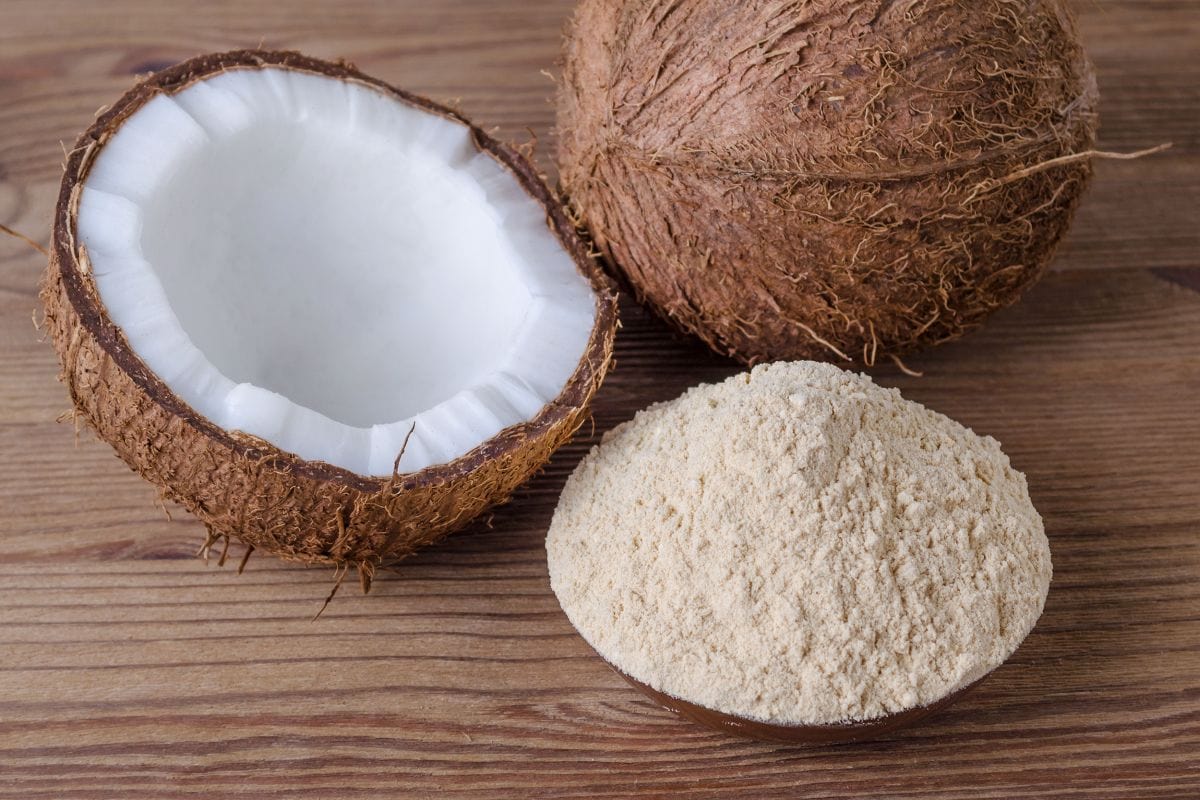Coconut flour is a gluten-free, grain-free alternative to all-purpose flour. It is made from coconut meat that has been dried and ground into a powder. Coconut flour is high in fiber and protein, and it has a unique flavor that makes it a popular choice for baking.

What Is Coconut Flour?
Coconut flour is a type of gluten-free flour made from dried, ground coconut meat. It has gained popularity in recent years due to its nutritional profile and its benefits for those with dietary restrictions. And coconut flour contains more fiber and protein than conventional flours.
When used as a substitute for traditional flours, coconut flour can make baked goods delicious while still being gluten free. Even though coconut isn't a nut, coconut can cause allergic reactions in some people who are allergic to tree nuts, such as almonds, cashews, and walnuts. So check with your doctor if you have a nut allergy and want to try coconut flour.
How Is Coconut Flour Made?
Coconut flour is made from the meat of coconuts, which are dried and milled into a fine powder. There are several ways that coconut flour can be manufactured. The most common methods involve drying out the meat of mature coconuts, grinding them down into a fine powder, and sifting out any impurities or large pieces of debris. Some manufacturers also soak their coconuts in water before processing them to add moisture back into the powder. This process allows for easier handling when making baked goods or cooking with the flour.
Benefits of Coconut Flour
You can enjoy several benefits by using coconut flour in your cooking.
- It is gluten free and grain free, making it suitable for those with sensitivities or allergies to these ingredients. You can use coconut flour to make gluten-free breads, cakes, muffins, pancakes, and more without any additional starches or gums.
- It is an excellent source of fiber, making it great for promoting digestive health and regularity. Studies have shown that diets high in fiber may help to reduce the risk of diabetes, heart disease, obesity, and certain types of cancer.
- Coconut flour contains more protein than all-purpose flour. Protein helps to build and repair tissue, regulate metabolism, and build lean muscle.
- Since coconut flour absorbs a lot of liquid when compared to other flours, it is ideal for making baked goods that have a light and fluffy texture. It also adds a slight sweet and nutty flavor to your food.
Does Coconut Flour Taste Like Coconut?
Like all other flours, coconut flour has its own unique taste. Coconut flour has a mild coconut taste. Some people like the flavor of coconut flour, while others find that it tastes too much like coconut.
Different brands of coconut flour have variations in flavor. Coconut flour gets its taste from the type of coconuts used and how it is processed. The amount you use in your recipes also affects the taste. Using too much can overpower your recipe with a strong coconut flavor.
Coconut Flour FAQs
Coconut flour is not a one-to-one substitute for all-purpose or other types of flour because it has a different consistency. Your results with substitutions will vary depending on the recipes you are using. So if you want to use coconut flour in your baking, you will need to experiment and find recipes that work well with this type of flour. If you are new to baking with coconut flour, start with recipes that are developed with coconut flour in the ingredients list.
Yes, coconut flour is a gluten-free alternative to regular wheat flour. Coconut is not a grain and does not contain any gluten. It is safe for people with Celiac disease or other conditions that require a gluten-free diet.
You can find coconut flour at most grocery stores, but you may have better luck finding it at natural food stores or online.
Store coconut flour in an airtight container in a cool, dry place like the pantry. Some people even store it in the fridge or freezer to extend its shelf life.
Bottom Line
Coconut flour is a versatile alternative to regular flour. It is gluten free, grain free, and high in fiber and protein. But keep in mind that coconut flour is not a one-to-one substitute for other types of flour. So be sure to do your research and experiment before using coconut flour in your cooking or baking. With the right recipes and preparation methods, coconut flour can be a delicious and nutritious addition to your cooking repertoire.


